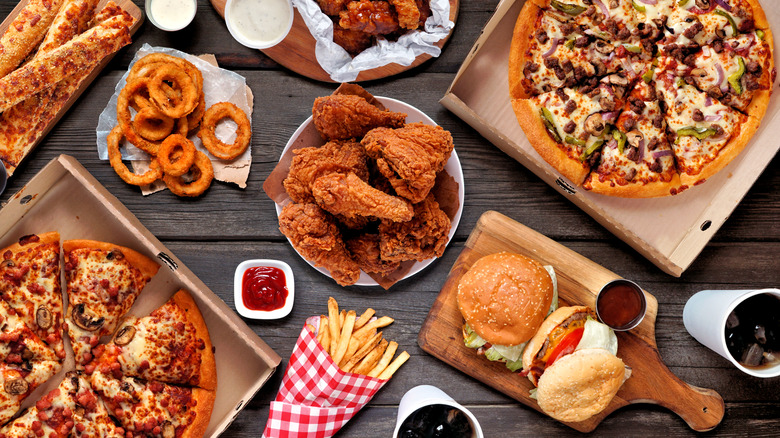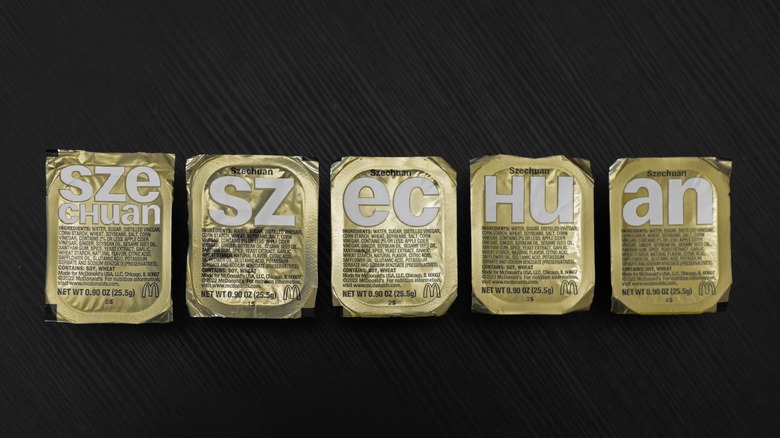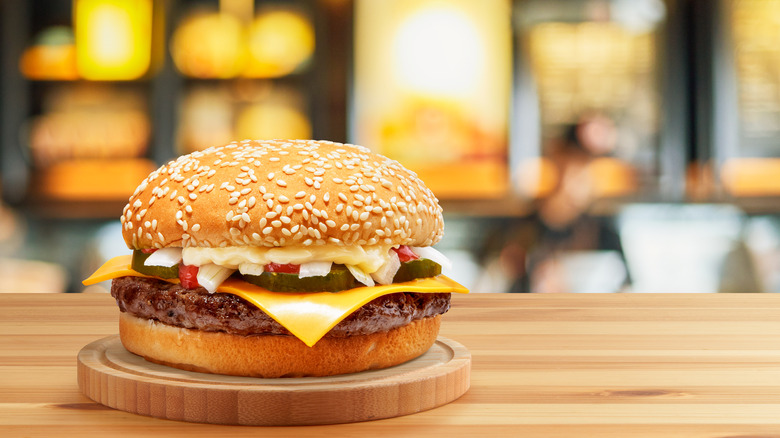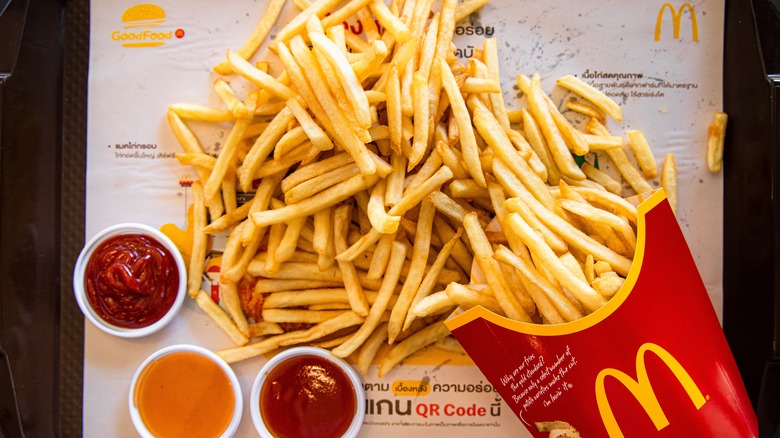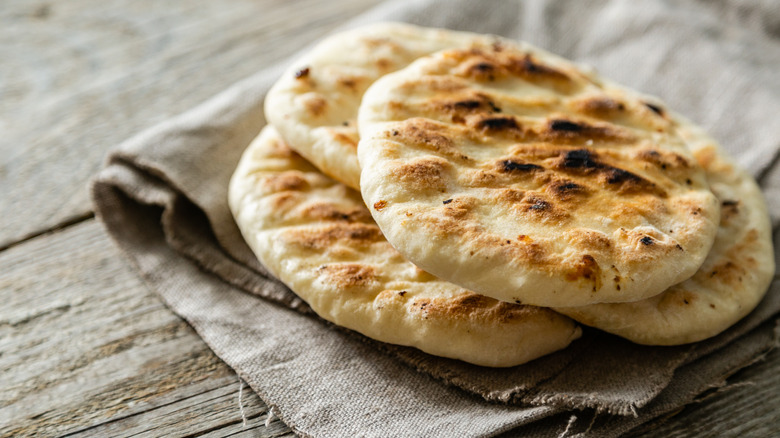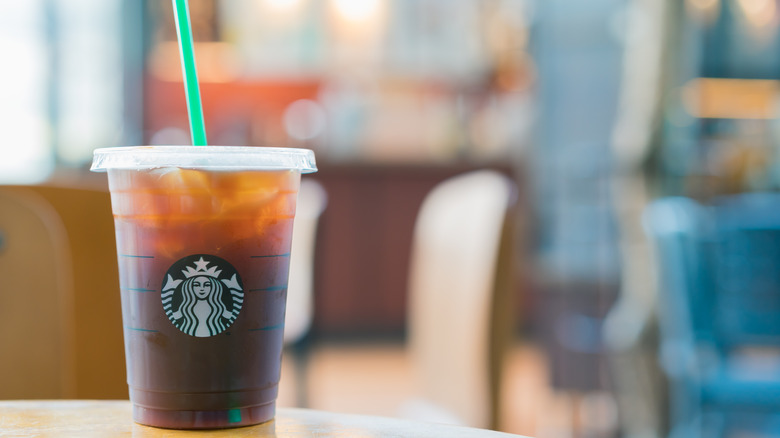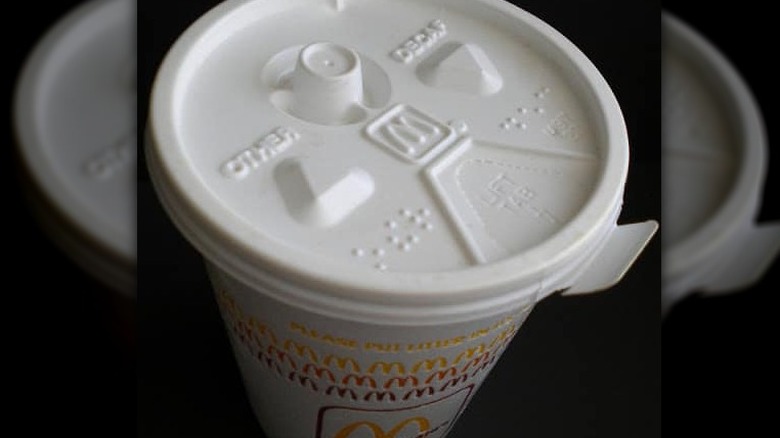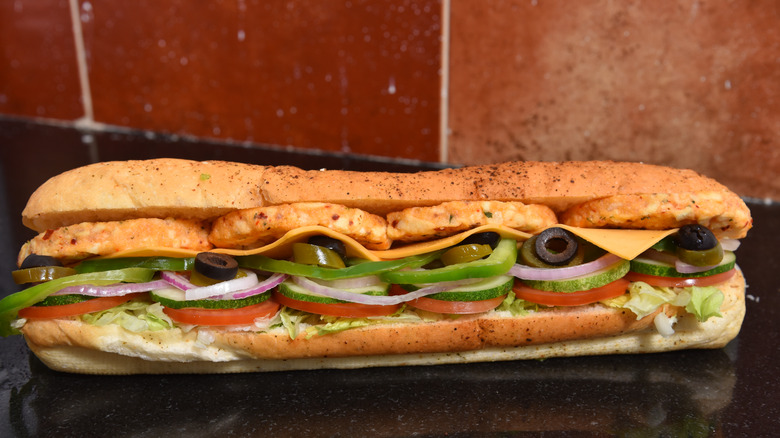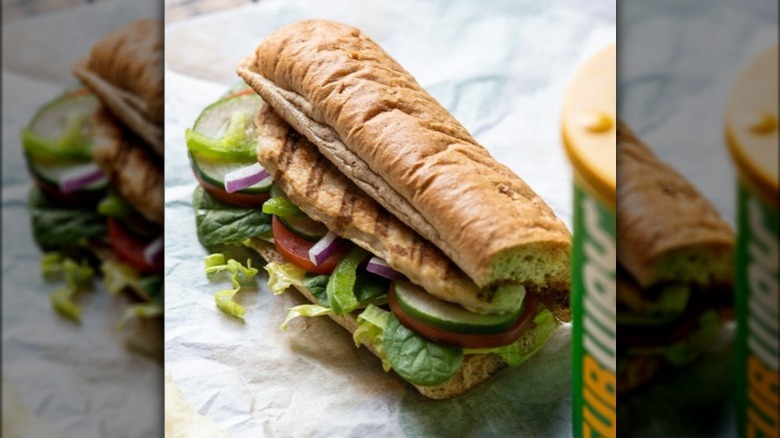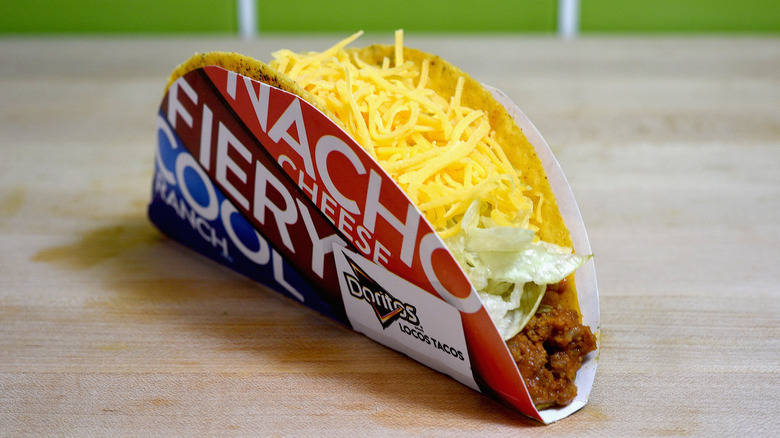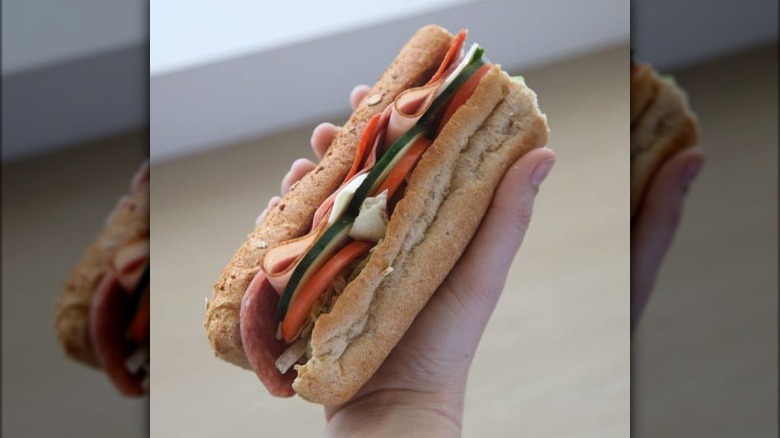Fast Food Items That Caused A Lot Of Controversy
Tearing your teeth into a heaping pile of crispy chicken, piping hot fries, or a succulent hamburger with all the fixins is bliss for most of us. Sadly, while we love our fast food, it doesn't always love us back. In addition to all the fats, carbs, and calories you'll get from the average fast food serving, there are also some serious nasties lurking in those Happy Meals. According to Fast Company, fast food colossuses like Taco Bell, McDonald's, and Chipotle regularly serve chemicals alongside stick-to-your-ribs grub. Known as phthalates, they're in both your burrito bowl and your favorite lipstick, and they're not the greatest to ingest. Likewise, plastic gloves might keep your food sanitary, but they can also impart some plastics into your cuisine (via Journal of Exposure Science & Environmental Epidemiology).
Tragically, for fast food connoisseurs across the country, phthalates might be the least of your concerns, depending on where you dine. Most major food chains have had at least one scandal in their history. From Szechuan Sauce shortages to literal poop in the product, these are the top controversial fast food items that might make you rethink that regular Saturday night burger run.
McDonald's Szechuan Sauce
In 1998, McDonald's launched its modestly mediocre Szechuan Sauce (via Salon). This condiment would have disappeared into the history books as a footnote or less if it wasn't for a surprise cameo on "Rick and Morty." In 2017, the adult animated series revived Szechuan Sauce, skyrocketing it to meteoric fame and prompting McDonald's to re-release it to fans hungry for a slice of pop culture lore. Unfortunately for Mickey D's, that's not exactly what happened.
"Rick and Morty" fans mobbed several McDonald's locations, creating massive queues and sauce shortages throughout the country. Some people even called the cops over the sauce debacle (via The Guardian). According to AZ Central, the re-released Szechuan Sauce, a companion item for the chain's buttermilk crispy tenders, wasn't even available at all locations. The botched promo infuriated people, but it didn't stop McDonald's from doing it all again.
According to USA Today, the franchise re-re-released Szechuan Sauce in early 2022. However, according to Reddit, the most recent Szechuan release had its fair share of kinks, prompting users to ask how the marketing department could screw up so epically twice.
Burger King's burgers
Burger King consumers across the pond faced an unexpected and frankly nasty surprise back in 2013 when it came out that the chain's British and Irish Whoppers had a different meat profile than they expected. According to USA Today, the flame-grilled faves had horsemeat in them. While Burger King emphasized that the quality or edible nature of the food wasn't an issue, consumers were still pretty disgusted because horses are not a traditionally consumed meat in that part of the world.
As The Guardian notes, the scandal reached a fever pitch, forcing Burger King to respond and fess up to the fact that you might be eating Mr. Ed at your local Liverpool chain. While the fast food chain admitted that horse DNA was in some of its patties, it downplayed the horsey flavor as only being present at "trace levels." Unfortunately, the situation wasn't just limited to Britain and Ireland. According to The Guardian, Polish meat suppliers came under fire, as the faux full-beef burgers were traced back to a supplier there.
To be fair to Burger King, "Horsegate" spanned far broader than just the solitary fast food chain. According to Prospect, this meat also found its way to big-box grocery stores, which is a sign of issues and a lack of transparency in the supply chain.
McDonald's fries
Back in the sepia-tinged days of yesteryear, McDonald's made its fries in tallow, an economical and flavor-forward choice that lent the side a nuanced, robust, and beefy flavor. As Atlas Obscura notes, McDonald's stopped preparing its fries in animal fat in the 1980s. Still, the resulting product just didn't have the zing and flavor of the original ones, specifically when it came to texture. Plus, there were no profound health benefits of swapping hydrogenated vegetable oil for tallow.
Although beef-flavored fries might sound delicious to some, they caused a massive scandal with vegetarians, who thought they were munching on the popular side guilt and cruelty-free. According to Treehugger, while McDonald's doesn't go full-on tallow anymore, there's still a touch of beefiness in the oil, perhaps to lend the fries that nuanced flavor of the past.
So, if you are a vegetarian in the United States and don't want to risk consuming beef, you might have to leave the fries alone. Meanwhile, vegetarians in regions like India can feast freely on totally meatless fries.
Taco Bell's beef
In 2011, law firm Beasley Allen decided to take direct aim at Tex-Mex titan Taco Bell by asking to see the receipts on their meat. According to NPR, Taco Bell emerged victorious from the scandal, but not before it had to endure a class-action lawsuit at the hands of Beasley Allen and prove that its beef was legitimately beefy. The saga started over YUM-brands' ground beef, the primary component of the chain's popular menu items, with the law firm alleging that it was more filler than beef (via Fox News).
According to Fox News, the meat only had a 35% beefy base, with the rest made up of preservatives, oats, soy, and water. At the behest of Amanda Obney, a Californian who wanted Taco Bell to fess up to the fillers, Beasley Allen sued the chain for false advertising.
Unfortunately for Obney and the law firm, it didn't quite go their way. According to CBS News, the lawsuit never saw the inside of a courtroom and was dropped. There is a bevy of possible reasons, but it all seems more enigmatic than the beef in your Taco Bell burrito.
McDonald's McAfrika
In the annuls of catastrophic marketing campaigns, McDonald's McAfrika (a burger featuring pita bread in place of buns) is a class of its own: a tone-deaf, bizarre promotion that was the perfect storm of nope. According to The Guardian, McDonald's rolled out its creation smack dab in the middle of a famine in Africa, prompting immediate outrage and inventive protests where local charities would dole out "catastrophe crackers." The crackers were protein-rich but probably very tasteless and were the cornerstone of food aid Norway sent to the African continent.
According to BBC News, the McAfrika suffered from various poor choices and factors. First, the timing was completely off. Secondly, the McAfrika was never even launched in Africa; it was rolled out in Norway. Although the menu item had a bevy of detractors, some people actually supported it, specifically the African Youth in Norway organization, who thought it was a positive representation of Africa amid a news cycle reporting horror and suffering from the continent (via BBC News).
It's hard to imagine a more controversial food item, and there's no doubt that the McAfrika will live on in botched fast food launch lore for decades to come.
Starbucks' iced coffee
Starbucks consumers were shocked when they learned that their morning cups of joe could contain something other than a lot of caffeine. According to Insider, the chain's iced coffees had trace amounts of feces. Not only is their presence just straight-up nasty, but this can also cause major gastrointestinal qualms and diarrhea. Even worse, other debilitating germs could be floating around in the brew, like salmonella, norovirus, or even Hepatitis A.
Calling poop the "hidden item in your Starbucks iced coffee," Global News illustrated a litany of terrible side effects, including rashes, ear problems, and angry bellies, and even quoted the levels as "concerning." While no coffee poop is good, this trend isn't just limited to Starbucks, as a 2016 study showed. The culprit is actually ice, and much of it goes back to lousy handling and unclean machines.
The news of Starbucks' poopy iced lattes broke in 2017, and Live Science quickly pointed out that you're not going to come across an actual turd in your drink. The fecal amount was bacteria-based, traced, and the contamination was limited. Still, we stick by the rule that zero feces in the brew is optimal.
Burger King's Halloween Whopper
In 2015 Burger King's customers got a spooky bathroom-related scare after eating the chain's Halloween Whoppers. According to Twitter users with the hashtag #greenpoop, the burgers made your bowel movements bright green. This hilarious and surely unintentional side-effect made this menu item trend for all the wrong reasons. According to CBS News, the emerald poop might be alarming, but it's not inherently dangerous and just a strange bodily reaction to the burger's jet-black bun: The bread's inky color comes from several different dyes, and the bathroom byproduct might be the result of blue coloring and bile or a combination of yellow and blue tints.
While hilarious in a ten-year-old humor kind of way, the green stool surely wasn't much of a laughing matter to the first customers who ate the Halloween Whopper and wondered if they would have to spend the night in the ER. Overall, it was an unexpected and bizarre trick tucked into the Halloween treat.
McDonald's coffee
This ultimate fast food controversy dates back to 1994. It's been examined in documentary films like "Hot Coffee" (via NPR) and is the butt of a million jokes. Still, despite popular belief, Stella Liebeck, the woman who sued McDonald's for its scalding beverage, wasn't a litigious monster. According to Vox, the chain's hot coffee debacle was massively misrepresented. Liebeck didn't sue because she spilled an unpleasantly warm drink on herself; she got third-degree burns from 190-degree liquid that McDonald's had already received hundreds of complaints about.
Furthermore, Liebeck wasn't gunning for millions; she wanted the franchise to cover her hospital bills, but when the mega-chain offered her shy of $1,000, she took them to court and won. According to the Texas Trial Lawyers Association, her burns were horrific, and McDonald's even noted the scalding brew was "not fit for consumption."
Interestingly, the chain is embroiled in another coffee-related lawsuit, this time for alleged chemicals in its caramel macchiato, after a woman allegedly burned her throat and discovered a strange chemical-like film in her drink (via Insider).
Subway's $5 Footlong
If you're like most people, the phrase "$5 Footlong" plays out in a singsong jingle in your mind the moment you read it, but while Subway might have had a stellar advertising campaign and one of the catchiest commercials in history, their actual product was a flop. The year was 2013, and $5 footlongs were all the rage, except according to the Chicago Tribune, the sammies came up short — size-wise.
Although the word "footlong" is right there in the name, the sandwiches were not measuring up. As the HuffPost notes, Subway's token $5 subs were actually 11-inches of overpromise and underdeliver, and the franchise only dumped napalm on the fire with its response. According to the chain, the term "footlong" was just the sandwich's name and was not meant to represent any true measurement in real life. Then, it blamed its overseas franchises and the metric system.
HuffPost also mentions that fans were quick to point out the utter hypocrisy, referencing a 2008 commercial where the subs' lengths are frequently referenced.
McDonald's McLean Deluxe
The early 1990s were not the best years for McDonald's. In addition to its scalding hot coffee lawsuit (via Texas Trial Lawyers Association), it also launched the low-fat dud of duds, the McLean Deluxe. Light on the fat and the taste, the menu item was a flavorless flop that emerged as a logical but ultimately unsuccessful response to some McCriticism.
According to The Seattle Times, the McLean Deluxe came hot on the heels of claims that McDonald's was contributing to an unhealthy eating culture and that each burger was one Happy Meal closer to a heart attack. The food was even called "poison" and chastised for its high fat and cholesterol content. Thus, the McLean Deluxe was born. It was a way for consumers to get their burgers and stay relatively healthy, although ultimately, it failed on the taste front.
The Seattle Times notes that the McLean Deluxe was also quickly launched after a brief testing campaign. Could the McTeam have worked out some of the kinks if they had more time? Maybe, but then again, there was the seaweed. According to The Baltimore Sun, McLean Deluxes contained carrageenan, a fancy word for the sea snack. Once that information got out to the public, the low-fat fast food burger was doomed.
Subway's oven roasted chicken
Subway isn't the first fast food restaurant to get dinged for questionable meat products, and it won't be the last, but in 2017, this fresh sandwich chain took a hit when allegations emerged that its chicken was only half bird. According to CBC, the franchise's grilled chicken subs, a seemingly healthy and whole food option on the menu, had 50% chicken DNA, leaving consumers to wonder what comprised the other half.
Although CBC admits that a marinated, heavily seasoned, or breaded piece of chicken would undoubtedly have less than whole chicken DNA, 50% certainly appears to be well on the low side. Subway responded to the claims, asserting that the meat was the real deal. It noted that the grilled chicken is spiced, marinated, and seasoned, occasionally with soy protein.
The statement does go on to say that other additions go into the chicken, like water, chicken stock, oil, garlic powder, chicken fat, and potato starch. While all those ingredients certainly aren't chicken, Subway insists they are minute amounts.
Taco Bell's lettuce
In 2006, Taco Bell got caught up in a scary food poisoning scandal possibly tied back to its lettuce. According to Medpage Today, franchise locations in the northeast United States served up E. coli-laced shredded lettuce along with their offerings. The lettuce was thought to be the primary culprit, although the chain's beef and cheese might have come into play, too.
According to the CDC, there was a crystal clear connection between E. coli and Taco Bell across several states, infecting over 70 people — some serious enough to require hospitalization. As Food Safety News notes, the franchise tried to put some daylight between itself and the rampant E. coli nightmare by claiming that the bug didn't originate from its locations but rather from ingredients that were sourced.
Blaming supplier Ready Pac Foods, Inc. for the tainted greens, Taco Bell was able to save face, its reputation, and perhaps even its company in the midst of one of the worst scandals on our list.
Subway's bread
What do your 8 a.m. yin yoga class and a meatball sub have in common? In 2014, the answer could have been your yoga mat. Unfortunately, according to CNBC, Subway's seemingly fresh bread had an unwelcome ingredient, the "yoga mat" additive. Azodicarbonamide is known for giving bread its texture and, presumably, yoga mats their springy feel. Predictably, this scandal blew up once people got the nauseating visual of chowing down on this workout accessory.
Although Subway was the only one called out on it, the additive was in a startling amount of fast food. As CNBC notes, big chains like Wendy's, Jack in the Box, McDonald's, Chick-fil-A, Arby's, and Burger King all used it in their bread products from time to time.
It's also FDA-approved. The sneaky yoga mat additive is just one example of how we might just want to enjoy our food rather than know exactly what goes into it.
